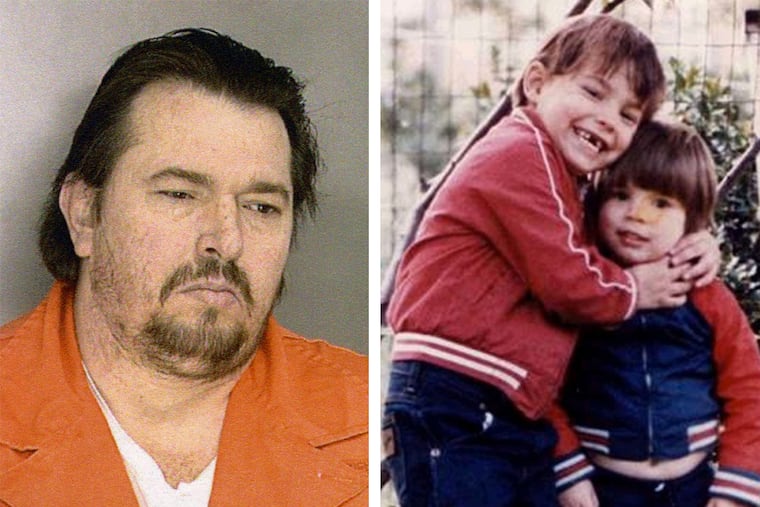Daniel Dougherty found guilty for third time in 1985 arson that killed two sons in Philly home
Two previous trials had found Dougherty guilty, but state Superior Court overturned those verdicts. Dougherty and his supporters contended the verdicts were tainted by key testimony from a fire investigator using outdated methods, but the latest jury disagreed.

Daniel Dougherty on Monday was convicted for a third time of setting the 1985 fire in an Oxford Circle rowhouse that killed his two young sons.
A Common Pleas Court jury of eight women and four men deliberated for seven hours over two days before finding the 59-year-old guilty of two counts of second-degree murder and arson causing death.
As the verdicts were read, Kathleen Dippel, Dougherty’s ex-wife and mother of their sons, let out a whimper. Dougherty showed little emotion; he climbed into a wheelchair that had been used to transport him into court and began wheeling himself toward an adjoining holding cell.
Judge J. Scott O’Keefe immediately sentenced him to two consecutive terms of life in prison.
“The acts that evening were despicable, Mr. Dougherty," the judge told him. "Pure revenge against a girlfriend and a wife. You don’t burn your own two children to death.”
The decision appears to finally settle a decades-long battle withinin and outside of the courts. At two previous trials Dougherty had been guilty, but Superior Court overturned those verdicts. Dougherty and his supporters contended that the verdicts were tainted by key testimony from a fire investigator whom they said used out-of-date and discarded arson-investigation techniques.
Dougherty opted for a third trial despite being offered a plea deal that might have made him eligible to apply for parole.
“It doesn’t matter how long it took for this day to come,” said Anthony Voci, chief of the District Attorney Office’s homicide unit. “The reality is that he was guilty at 4 o’clock on the morning of Aug. 24, 1985.”
Dougherty has maintained his innocence since that night, when a fire destroyed the home where he lived with his girlfriend, Kathleen Schuler; her young son; and his two boys, 3-year-old John and 4-year-old Daniel Jr.
In 2000, he was tried, convicted, and sentenced to death for the arson deaths. In 2012, that sentence was reduced to life in prison, and in 2014, an appeals court ordered a new trial. Both changes were attributed to the ineffectiveness of his original defense attorney to challenge the fire science presented against him.
At the second trial, the judge allowed introduction of testimony from the first trial by the city fire investigator, who was unable to testify at the retrial. The appeals court said that violated Dougherty’s right to face his accusers.
During the trial, which began last month, the prosecution portrayed Dougherty as a jilted lover who set the house on fire as vengeance against both his ex-wife and his girlfriend, who owned the home and planned to end their relationship. (Neither she nor her son was home at the time.) Prosecutors said he set three fires in the house and left his sons to die in their upstairs bedroom. They contended that “accidental” fires don’t come in threes.
As proof, the prosecution pointed to testimony from Dougherty, who at his trial in 2000 admitted to feeling responsible for his children’s deaths — not because he lit the fires, he said, but because when he awoke on the living room couch surrounded by flames, he instinctively ran out of the house to grab a garden hose instead of running upstairs to rescue his sons.
Dougherty’s longtime attorney, David S. Fryman, argued that no one saw Dougherty light a match or heard him discuss a plan to burn the house down, or saw him act in an unloving manner toward his children. The defense argued that it is extremely difficult to determine where the fire originated “after even a very short period of full-room involvement,” Fryman said.
Fire scientist Craig Beyler testified against the three-fire theory, contradicting the conclusions set forth by the Fire Department. He said that when a fire consumes an entire room, burn patterns can be lost.
Beyler said that after reviewing the evidence, he determined the cause of the fire should have been listed as “undetermined.”
In an interview after the verdict, Voci, the homicide unit chief, disputed that there has been any appreciable change in the science of arson investigations.
“The way fire science is recorded and described may have changed, but basic elements of fire science haven’t changed for decades,” he said. "And I think this case here was an attempt by some people to try to use technology and try to use something new to create doubt. But the truth always rises to the top.”
Dougherty’s ex-wife declined to speak after the verdict, but she hugged one of the prosecutors, Ashley Martin, and said, “I can’t thank you enough.”
Martin choked back tears. “It feels," she said later, "like justice for those boys.”